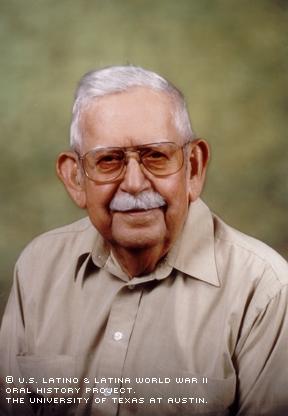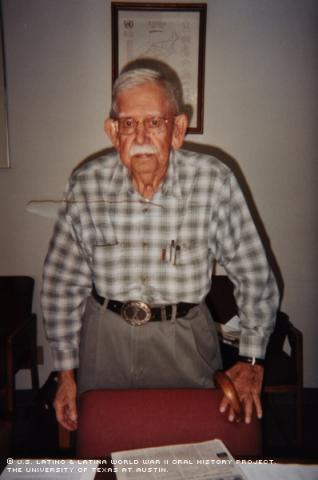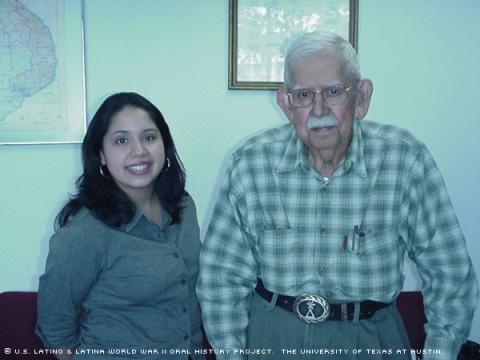


By Nikki Muñoz
Rafael A. Guerra has always had an optimistic outlook on life, relying on an affirmation for help through life's rough spots, including his tour of duty: "If the sun comes out today, it is going to shine on me; if it doesn't come out, it won't," said Guerra, relating the mantra.
Guerra inherited a keen business sense from his father, who as a teenager, moved to Starr County in Texas from Mexico in 1878. The move was prompted by an opportunity to help run a general store his cousin, Primitivo Guerra, owned. Later, his father was made a business partner and eventually became the store's sole proprietor. With his earnings, he and his brother-in-law purchased a ranch they called La Reforma, where Guerra was born in 1915, two years after the birth of a brother, Arcadio Guerra, Jr. His parents' first child, another boy, died at the age of 2 months.
Guerra’s father owned a second ranch, purchased when the previous owner was forced to sell to satisfy a gambling debt. The acquisition increased his real estate holdings to 20,000 acres. By this time, he also owned a second store and a pair of cotton gins.
"Ranch life was very simple, we could play all day if we wanted to," Guerra said.
That carefree existence ended when he was 6 and his father had a serious accident. Guerra’s father sustained a head injury when a mule knocked him to the ground, causing a blood clot to develop in his head. As a result, his father became incapacitated for the remainder of his life.
After graduating high school, Guerra enrolled in Edinburg Junior College, (now The University of Texas-Pan American) before transferring to Texas A&I University in Kingsville. He dropped out in 1937 to help care for his ailing mother, who died that same year. Two years later, his father passed away. Guerra's plan to resume his education after his parents' death was interrupted by war.
Before entering the service, he returned to the family ranch to commiserate with his brother over their future.
"We told each other whichever one of us gets drafted first will go, and the other will stay here and take care of the ranch, and I got called first."
On Dec. 6, 1941, the day before Pearl Harbor, Guerra was inducted into the U.S. Army at Fort Sam Houston, Texas.
"I was only supposed to go for one year, but that one year turned into four years and several months," he said of his tour of duty.
After boot camp at Camp Roberts in California, Guerra was sent to be part of a bomber squadron guard off the coast of California as a member of the 134th Anti-Tank Company. Guerra helped guard the coastline, walking the beach overnight for three months until he was sent to Alabama for additional training. There, he was sent to language school to learn Italian. Guerra was assigned to guard Italian prisoners of war transported to the United States, and had to learn to communicate with them.
"I couldn't read or write it [Italian], but I knew enough to get by in a conversation because it is very similar to Spanish," he said.
Later, Guerra helped transport German prisoners of war. Soon after, he was sent to New York for more training, and was assigned to mail duty for three months in New York City. He’d now served for three years and was ready to get out. But the Army still needed him, and he was promptly sent for more training in preparation for a tour of the South Pacific.
"For 3 1/2 years, I never left the States, and then when I tried to get out, they sent me overseas," he said with a laugh.
Guerra was on his way to Saipan when he learned of Germany's surrender. He ended up in Okinawa, where his duties included building structures to house bombs and ammunition. He found brief respite from work when he met up with a cousin in Okinawa who was serving in the U.S. Navy. Guerra said the Army had given everyone a sack and told them to fill it up with whatever suitable material they could find to fashion a makeshift mattress. He didn't have to resort to these measures thanks to his cousin, who gave him a ready-made mattress on his visit, along with a pillow and a bottle of whiskey.
Celebration was in the air when the U.S. dropped atomic bombs on Japan, signaling the war was near its end. Ironically, given the celebratory backdrop, Guerra first encountered the ugly aftermath of war during this time: In Okinawa, he picked up an abandoned Japanese boot from the ground, only to discover a human shinbone still attached.
"I didn't see much action," he said. "The only time I almost got shot was by a nervous GI; we didn't halt and so he took a crack at our truck, but he missed because I am still here."
Shortly after, in January of 1946, Guerra was discharged.
Upon returning to the U.S., he married Carmen Chapa and resumed working with his brother, who’d stayed behind to manage the family enterprise. Guerra eventually had six children, one of whom died in 1979. The surviving kids now help run the family's businesses.
After the war, Guerra served on his local school board and participated in other civic activities centered on educational opportunities for Latinos. He was also honored by the Agricultural Department for 42 years of volunteer service. A scholarship in honor of his deceased son has doled out more than $100,000 in scholarships, and Guerra recently established a second scholarship in memory of his father.
"I can't complain," said Guerra, reflecting on his Army years before offering a second affirmation: "Try to live a clean life where you can go to sleep with a clear conscience."
Mr. Guerra was interviewed in McAllen, Texas, on April 6, 2002, by Nicole Muñoz.

